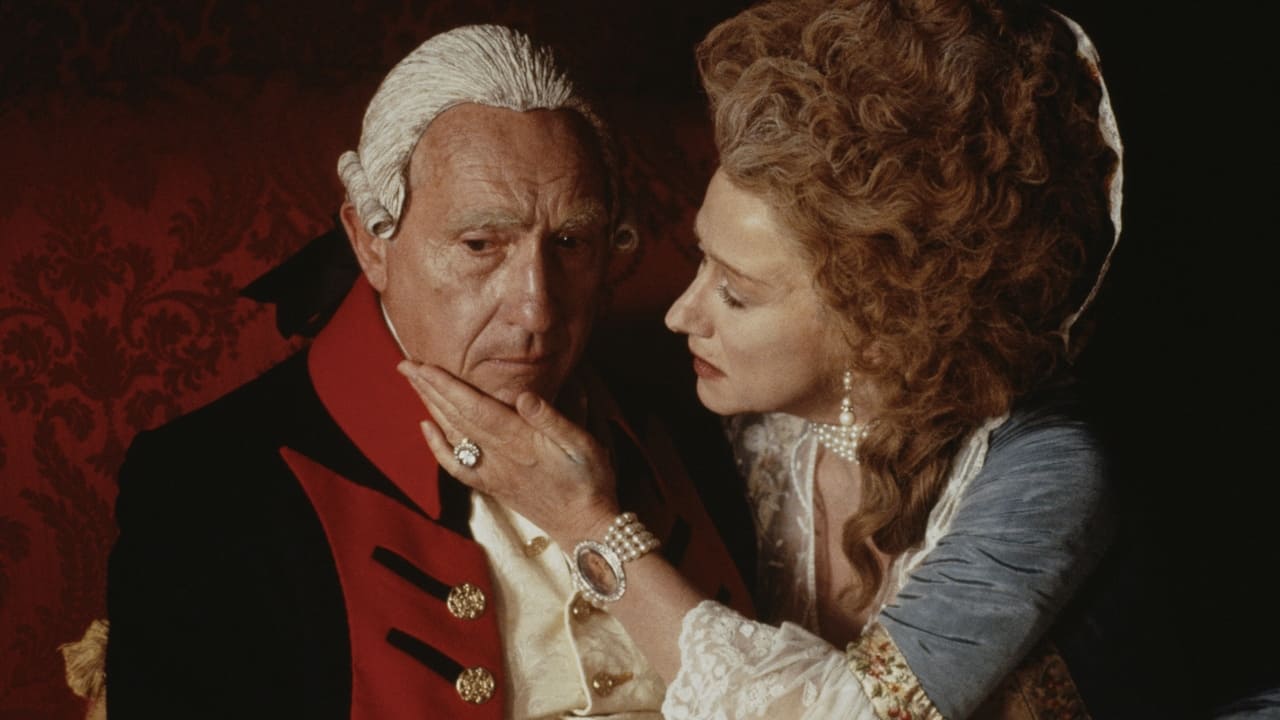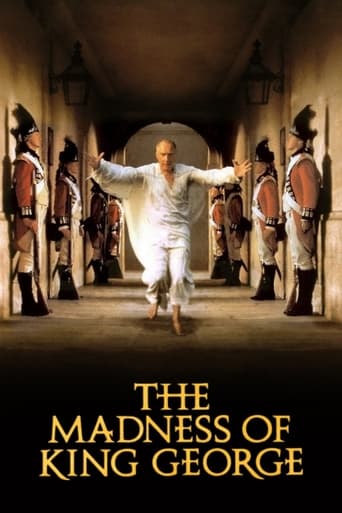

Producer Stephen Evans, helping to launch the career of Actor/Director Kenneth Branagh in 1989 with Henry V., also gives stage director Nicholas Hytner a shot towards the cinematic visualization of a play by Alan Bennett in the production of "The Madness of King George" (1994).Set in England of 1788, the character of King George III., performed by engaged Nigel Hawthorne (1929-2001) in a part of a life-time, mourns on the loss of the New World at dark and gritty designed sets of Windsor Castle by production designer Ken Adam, who also prepared Stanley Kubrick's sets for "Barry Lyndon" (1975) and the James Bond movies of the 1960s and 1970s. Director Nicholas Hytner had been well advised by Cinematographer Andrew Dunn to shoot the majority of the picture with a wide lens in order to capture the whole environment even in close-up shots, which gives "The Madness of King George" a constant glance at life conditions even with the Royal Family in 18th century.Actor Nigel Hawthorne, carrying the picture with two strong supports, on the one side actress Helen Mirren, who gives life to Queen Charlotte, with who she stays behind her possibilities in any given scene, preparing emotional space for the character of George III to own the picture; on the other side, the character of Willis, the doctor without a license, portrayed by Ian Holm with one evil eye on torture practices before bowing to the newly recovered King with his family by the end of "The Madness of King George", which had been a motion picture put in the vintage pool of 1994 with cinematic splendor from "Pulp Fiction" at the Cannes Film Festival, "Forrest Gump" and "The Lion King" side-by-side as Summer Smash-Hits for the masses, "Natural Born Killers", becoming the alternative choice to all the sweeteners and the hidden glow of "The Shawshank Redemption" about to explore in years to come.Director Nicholas Hytner just shared enough information with his leading man Nigel Hawthorne to give the actor the freedom of developing the nature-loving, bound in low life extravagance George, having his most convincing beats, when meeting a pig farmer on the country side to kiss a freshly born pig on the muzzle and further peaking in his performance with an heart-breaking speech in a room with prime minister and his staff explaining that the American continent is a paradise lost to the common man.The king's son also named George, portrayed by a slightly pale and faceless Rupert Everett, can not convince any society with his low-tempered appearances in public, so that the actor gives room to an ultimate punchline, "You wish me death, you little brat" where the character of George acts on fire and finally taking charge of his kingdom, after at times in-balanced and indecisively directions by Nicholas Hytner with regard to a sequence spanning six months of treading a disease of the nervous system called Porphyria with a carrying through actor Ian Holm as leading force and a luckily visual-rescuing soundtrack by George Fenton that conclusively Nigel Hawthorne got into position to give his interpretation of King George III a round-up, when the final curtain drops for the otherwise well-crafted motion picture called "The Madness of King George".© 2017 Felix Alexander Dausend (Cinemajesty Entertainments LLC)
... View MoreIt was a random movie for me. Just about a tag in the historically theme. But when i watched, it became some sort of lost masterpiece with a soft theater look. All I can say that is all about perseverance in elderly life. Yes, its about a king, but it is about how you can maintain your strength and will in some difficult situations in life. I'm about thirty, and i have a daughter, so i understood how some of the funny moments of managing a family in this movie developed in a bizarre way, the family struggle vision, and everything happening side-by-side with corruption and power desires (its a kingdom, anyway). So, for me, its the kind of movie that some of the older members of your family would love to watch. Most because its an elegant movie about how an old man that lost his moral due his condition can return to power, proving that everyone has a chance to reclaim a second chance in a younger, greedier world. Unless you want the crown, so... don't show them this movie.
... View MoreThis movie was something I wanted to see when it came out in 1994 and I was only nine years old, so of course Mom didn't allow it. I remembered the movie tonight and got a hold of it. I think that had I watched the movie that young, ratings aside, I would probably have appreciated Rupert Graves' handsomeness more than the tale the movie was trying to tell me, so I'm glad I waited. The movie was horribly slow-paced at times. It could have used a rewrite and a tightening up of the script. However, the acting from everyone was wonderful and anyone else playing King George III might not have saved the movie from its script. I also felt moved by the predicament of having a nervous system condition that IMDb claims I'm misspelling when I'm not misspelling it in an age where modern medicine thinks that giving you boils will cure something and modern psychiatry is locking people (some of who aren't actually legitimately mentally ill) in an asylum. If you're looking for something that is somewhat thought provoking, has wonderful acting, and is set during the Regency, this would be a movie to consider. On that note, if you do not have patience for a slow script, occasional too much dumped on you at once before meandering again, then reconsider.
... View MoreI rarely give out praise for a film, but here is one that I have enjoyed watching the second and third time. Excellent story, rooted in reality, well crafted, great acting by the world's best, great and accurate costumes, comportment, sets, historical accuracy.The story guides you to the seminal moment when George is reading King Lear with the Minister from government and regains his sanity in one of the finest moments in cinematography, which could only have been portrayed, ironically enough, by elite stage acting. Why is this so? Because the Royal Family would have carried themselves like stage actors back in the 18th century. Whether the directors and actors knew this or it simply came together, it's absolutely brilliant.In short, kudos. I give only 9 out of 10, because I thought the machinations portrayed in Parliament and of the Prince were a little exaggerated.
... View More